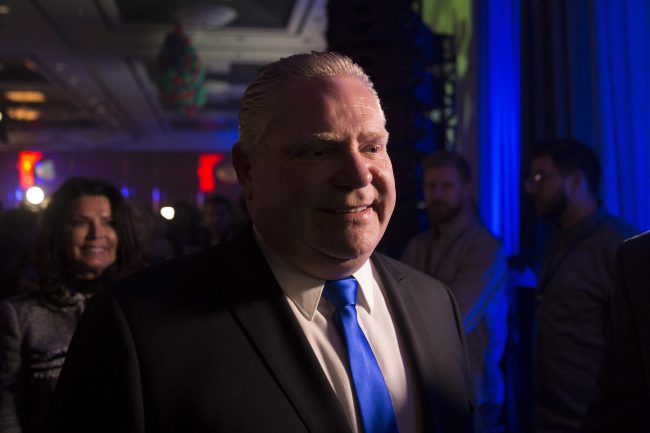Disaster. Debacle. Clusterf***.

There simply aren’t enough epithets to describe the shambles that was the Ontario PC Party leadership convention this past weekend. Members, media, and twitterati watched in amazement as the counting dragged on for four hours while lawyers for the rival leadership camps of Christine Elliott and Doug Ford duked it out with party officials. At issue was the party’s electoral-college style voting system, with the Elliott camp alleging that votes had been misallocated to districts in which the voters did not actually live, thereby changing the outcome in favour of Ford.
WATCH BELOW: Doug Ford, Rob Ford’s brother, wins Ontario PC leadership race

Frustration turned to fury shortly after 7 p.m., when Hartley Lefton, chair of the PC’s leadership election organizing committee, informed the crowd members they would have to leave, still sans leader, while the party continued to verify the results. Amid the ensuing boos and jeers, former MPP Frank Klees had an epic meltdown, saying that he was “disgusted and embarrassed for our party,” and called on the entire executive to resign.
Several hours later, the long-awaited denouement: party officials convened a news conference to proclaim Ford leader by a margin of 150 points. The only other candidate who showed up for the announcement was Tanya Granic Allen.
Caroline Mulroney sent a congratulatory note on Twitter, while Elliott continued to dispute the outcome throughout the day Sunday, claiming to have won the popular vote and a plurality of ridings.
“Our scrutineers identified entire towns voting in the wrong riding,” her statement read. “In a race this close, largely determined by geography, someone needs to stand up for these members. I will stand up for these members and plan to investigate the extent of the discrepancy.”
Elliott later stood down, and withdrew her challenge, after a private meeting with Ford.
Good grief. You could almost hear former leader Patrick Brown’s laughter all the way from Barrie. The PC powers-that-be had touted this race as a fresh start after Brown’s exit under a cloud of sexual harassment allegations. But many, including Brown, saw it instead as a palace coup designed to install someone the establishment found more saleable.
WATCH: Kathleen Wynne on Doug Ford PC leadership win: It doesn’t matter who I’m running against

Instead of a fresh start, it became a non-stop soap opera that saw Brown resign, then re-enter the race at the eleventh hour, then quit; debates where Granic Allen railed against teaching kids about anal sex and promised to rip windmills from the ground; and complaints from thousands of angry members who had been denied their votes because they had not received their registrations in time, or were unable to vote online.

Get daily National news
In a last act of desperation, a member launched an injunction proceeding to extend the deadline on the very day it was set to expire; his bid was rejected by the courts.
And then, there was Ford. Mocked for launching his campaign from his mom’s basement, pooh-poohed by party brass as too far right, burdened with the baggage of his late brother Rob’s chaotic mayoralty, Ford was not supposed to win. So why did he? Answer: because of the party itself.
Ford came in as the anti-establishment candidate, in a race seen to be manipulated by party establishment from odious start to bitter finish. Ford was helped to victory by Granic Allen, another outsider who martialed the social-conservative vote and delivered 83 per cent of her support to Ford on the second ballot. Together, they stuck it to the party executive – but now that the race is done, can that anti-establishment message translate into victory in the general election?
The answer is: yes, assuming Ford channels it properly.
There is a lot of anger against the incumbent Liberals, who have held power since 2003; poll after poll shows Ontarians ready for change, and Ford’s populist style will resonate well with those electors, particularly in the 905, 705 and 289 area codes.
But Ford cannot simply oppose; he must propose, too. In that vein, there are many fertile subjects he could mine that have been sorely neglected by the current government. Here are three that stand out:
The first is education. Perhaps nothing represents a greater failure of the current government than Ontario’s education system. The sex-ed curriculum may be a lightning rod for more socially conservative parents, but it is the tip of a vast iceberg of problems. Math scores have been declining for years after the province trotted out its “discovery math” curriculum, which forsakes traditional methods such as memorizing times tables for “group problem solving” and learning the “why” of two plus two.
Violence in classrooms is reaching epidemic proportions as class sizes balloon and the number of special needs kids grows, a mix which sees teachers donning Kevlar armour to deal with frustrated kids in chaotic classrooms. School boards like the TDSB obsessively prioritize equity over excellence, adopting a lowest-common denominator approach which would eliminate streaming and which nearly axed specialized schools until parents rebelled.
Ford could propose a real alternative: a whole-child approach to education that eschews the current social-justice obsession and instead offers a strong basic curriculum. This would include a return to traditional math instruction; a focus on core subjects like math, languages and science; and incorporating physical fitness and the arts into not just particular classes, but the curriculum as a whole, giving kids an outlet for their energy and creativity.
Promoting school choice would be another great proposal: this could be achieved by eliminating school districting, which limits kids to their local schools, and allowing the creation of Charter schools, as in Alberta, where parents can get together to establish schools that meet their children’s needs.
After education, the next greatest failure of the provincial government is health care. Hospital emergency rooms are painfully overcrowded. Patients including children are lined up like cordwood in hospital hallways because there are no rooms and beds; one Sudbury man made headlines for spending 13 days in a hospital toilet.
Waits for specialists grow ever longer, while some vital services have been delisted altogether. The government may offer “free” drugs to all Ontarians under 25 and full gender-transition surgery as of 2018 , but break your ankle and you cannot get physiotherapy, eye exams are not provided for adults, and you have to wait 671 days in some regions for knee replacements.
There are a myriad of possible solutions for these problems. These include changing the funding formula from block funding for hospitals to one where money follows the patient, which would incentivize institutions to treat patients as assets, rather than liabilities. It also includes a greater focus on home care, to keep senior citizens out of hospital, and in their homes where most of them would prefer to stay. It also means building more long-term care facilities for seniors in their communities, ensuring that they are not shunted to homes miles from loved ones, or separated from spouses, because there are not enough facilities to care for them where they live. It means partnership between the public and private sector, and more private health care, such as knee and hip surgeries, which can be purchased privately in Quebec via private insurance, to create a real mix of services such as is found in European countries, where the two systems complement each other and reduce wait times.

WATCH ABOVE: Partial sale of Hydro One will cost Ontario $1.8 billion, FAO says
And then, there’s energy. Wynne’s attempt to reduce hydro rates by amortizing the utility’s debt has proved a costly failure, which will see both rates and the provincial debt rise in a few years as a result. Rural Ontario bears the brunt of high hydro rates, due to the higher cost of delivery, which was further increased when the province upgraded hydro infrastructure following the 2003 blackout. These were touted as insurance against future failures, but critics claim they were actually conducted to facilitate the transmission of green energy from the thousands of new power producers who set up shop after the government offered subsidies to generate wind and solar power – power for which the province overpays due to contracts locked in at above-market rates.
Instead of simply spreading the cost from ratepayers to taxpayers, as the PC party’s People’s Guarantee advocated, Ford should exact higher rates for transmission from rural producers who benefit from it, and use the funds to reduce transmission costs for rural consumers. He could also continue the party’s proposal to rebate consumers the $350 million dividend from the sale of shares of Hydro One, though this would likely impact the government’s bottom line in other areas, necessitating cuts to offset it. Finally, he should bring in income tax reductions, as the party had already proposed, which would help not just with hydro costs but the cost of living in general – and which could be drawn against the increase in tax revenue the government will reap from the hike in the minimum wage, which saw wages jump from $11.40 to $14.00 an hour in January.
WATCH BELOW: Doug Ford greets well-wishers at St. Patrick’s Day parade in Toronto, his first as the new Ontario PC Party leader

This type of “Back-to-Basics” platform, focusing on the everyday needs of average voters, would suit Ford and the party that he now leads. If he and the PCs are to put this sorry circus of a leadership behind them, they will need to offer more than anger and populism. They will need serious substance – substance the establishment has failed to deliver.
Tasha Kheiriddin can be heard between noon and 2 p.m. ET on Global News Radio 640 Toronto. She’s also a columnist with Global News and iPolitics.ca, where this piece first appeared.












Comments
Want to discuss? Please read our Commenting Policy first.